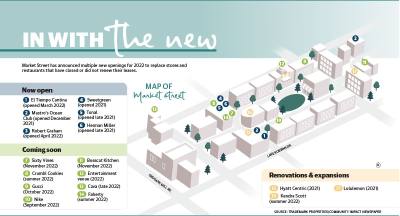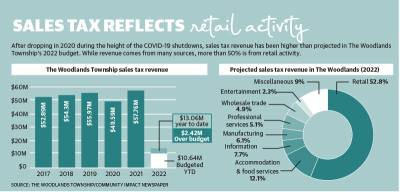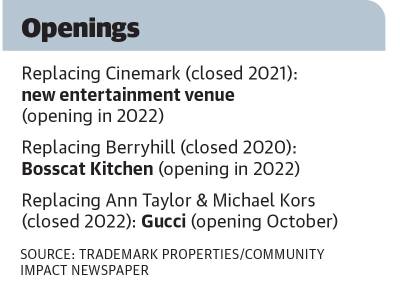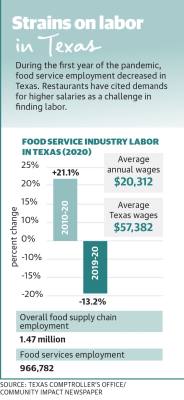While the center’s management company, Trademark Properties, said it frequently changes tenants to maintain a spectrum of offerings, some of the more prominent spaces have changed hands during the pandemic.
Among the newest announcements of tenants for the complex are a new entertainment site—which will replace the Cinemark movie theater that closed Dec. 31—and Bosscat Kitchen, which will replace the Berryhill Baja Grill that closed in 2020. In addition, new retailers planned for the fall include Gucci and Nike.
"Tenants that weren’t thriving before pandemic, ... it was the last straw, and of course we lost some tenants,” Marketing Director Noemi Gonzalez said of some of the closings that occurred in 2020-21.
Closings included Gina’s Tees and Levure Bakery, who could not be reached for comment as of press time.
Despite the recent influx of luxury brands such as Gucci, Gonzalez said the center is not exclusively seeking out luxury tenants.
“Having some of the luxury tenants is nice—you don’t have to drive into the city—plus ... this helps the community, keeping dollars here,” she said.
Changes on the way
Gonzalez said changes in the center have largely been due to three reasons. Some businesses struggling before the pandemic did not survive the 2020 shutdowns; other businesses chose not to renew their leases for strategic reasons; and for some, Market Street officials chose not to renew the lease because they were looking to move in a different direction.
Market Street opened in 2004, and many of the anchor tenants joined the center in the years immediately after it opened, meaning those leases are now approaching the 15-year term and some re-evaluations are taking place, Gonzalez said. For example, Nike will take over after the expiration of The Gap’s lease this year.
“The Gap has vacated the market; they’re also leaving [The Woodlands] Mall,” she said. “The lease expired, and obviously we can’t leave a space vacant, so as soon as we know a tenant has a year left we actively start working on the space.”
Two popular restaurants were also replaced in the past year due to varying circumstances, Gonzalez said.
“Grotto and Jasper’s [leaving] were two completely different scenarios,” Gonzalez said. “[Grotto] was an internal company decision within the Landry’s corporation. ... They thought they could make better use of the space. Jasper’s, they had a really good run, ... and then the pandemic hit.”
Grotto was replaced by Mastro’s Ocean Club, which opened in December. The location has a dress code and serves seafood and steak. Jasper’s closed in early 2022 and will be replaced by Sixty Vines in November following a renovation, Gonzalez said. Sixty Vines features cuisine “inspired by the wine country,” according to its website.Bill Hyde, Abacus Jasper’s Restaurant Group CEO, said in a statement in February that Trademark Properties did not offer Jasper’s rent relief at the start of the pandemic. Instead, Jasper’s was offered a rent deferral through 2020. According to Hyde, Jasper’s revenues were down 52.6% in 2020, which was the first year since the restaurant’s inception that money was lost.
“Jasper’s, like all other restaurants in this great nation, sought every means by which to stay open, keep our staff employed and help The Woodlands community with their meal needs in what was a truly scary and unprecedented time,” Hyde said in a statement released to Community Impact Newspaper.
Hyde said as the company was not able to provide the full payment of the deferred rent in a 12-month time frame, Trademark Properties terminated the lease. He said the restaurant plans to open another location in The Woodlands in the future.
Among shopping locations, Market Street continues to court luxury brands: Tiffany and Louis Vuitton are among the current tenants, and Gucci is coming in October to replace Ann Taylor and Michael Kors, whose leases were up this year, Gonzalez said. However, the goal is not to be exclusively a high-end, luxury shopping center, she said.
“We never [intend] to go full luxury; we are a family-oriented center and community,” Gonzalez said. “I love seeing families out here. ... The local team here—we take pride that people are coming to Market Street to make memories. Full luxury is not family friendly.”
To that end, the center continues to offer seasonal events, such as a Concert in the Park series in May, Memorial Day festivities and a quarterly Change for Charities program that collects money for four area charities each year through parking meters.
Retail recovery
Despite changes among tenants, retail spaces in The Woodlands have seen fewer vacancies in the past year, down to a 4.8% vacancy rate in the first quarter of the year compared to 5.5% at the same time in 2021, according to information from real estate firm Caldwell Cos. This is lower than vacancies throughout the Houston region, where as of the fourth quarter of 2021, the overall vacancy rate was 5.8%, down from 6.2% the previous quarter, according to commercial real estate firm Colliers.
Jason Gaines, a retail analyst at the commercial real estate agency NAI Partners, said increases in sales tax revenue have been consistent due to “nearly absolute” business stability.
“Most of the tenants that were at risk of business failure endured, and for certain there is net positive retail commerce in The Woodlands now moving forward,” Gaines said.
Sales tax receipts in the township have also grown with revenue coming in 22.7% above budgeted amounts as of the first quarter of the year, according to township records. In the fiscal year 2022 budget, running from January to December, The Woodlands Township estimated 52.8% of sales tax would come from retail trade, and the next-highest category was from accommodation and food services, making up 12.1% of the total. A total of 64.9% of sales tax revenue in The Woodlands is projected to come from retail and food services, both found in Market Street.
Bruce Rieser, the chair of the Visit The Woodlands board, which is the township’s convention and visitors bureau, said retail is a large piece of the township’s appeal to visitors, and commerce is growing alongside a general return to travel as disruption from the pandemic recedes.
“This is the inevitable next stage after COVID and the lack of travel during that particular period,” he said. “It’s obvious that travel, especially from Mexico and Central America, has increased over the last nine months now, so it’s really having an impact.”
Sales tax revenue does not come entirely from local retail sales, however, especially since local jurisdictions now collect sales tax from internet sales since a U.S. Supreme Court decision went into effect Oct. 1, 2019. This allows internet sales tax revenue from major online marketplaces to go to local jurisdictions.
“Market Street and [The Woodlands] Mall are both doing quite well and performing very well in comparison to their competitors, but there’s a huge impact from the change in the internet sales collection that is driving a lot of this [sales tax increase] as well,” Rieser said.
Although The Woodlands has seen an uptick in sales tax revenue as well as retail occupancy, it is not alone in the region, Gaines said.
“This is not unique to The Woodlands,” Gaines said. “Just about all ‘hands of the clock’ around the Houston area are experiencing population growth, [and] demands for goods and services are rising.”
Labor challenges
JJ Hollie, president and CEO of The Woodlands Area Chamber of Commerce, said he believes the issues Market Street has seen with businesses closing are widespread in the retail industry since the pandemic started.“The biggest challenge are labor and supply chain, and then you roll in inflation on top of that, ... it drives up your cost,” he said. “Hopefully this wave of inflation ends as people get back to work. ... We still have that COVID hangover. [It will be] a rough few months.”
Gonzalez said staffing has been the most consistent challenge for businesses, particularly restaurants.
“The biggest challenge we had, ... even to this day, is still staffing,” Gonzalez said. “It’s just changed ... the whole workforce, the demands of employees, salary rates [and] hourly rates.”Across Texas, restaurant and bar employment dropped by about 13% from 2019-20, and the average annual salary among employees in the food services profession was $20,312 as of 2020, according to the Texas comptroller’s office. In Texas, the average annual salary statewide was $57,382 as of the fourth quarter of 2018, the most recent information available, according to the comptroller’s office.
Despite the strain on workers, Gaines said inflation does not present as much of an obstacle in retail leasing as other economic factors do.
“Retail leasing and occupancy should not have a huge issue with rising inflation,” Gaines said. “That will affect the market for sale of property. ... If a deal in The Woodlands doesn’t sell, send it my way. ... All of my clients are interested.”
Ally Bolender contributed to this report.










